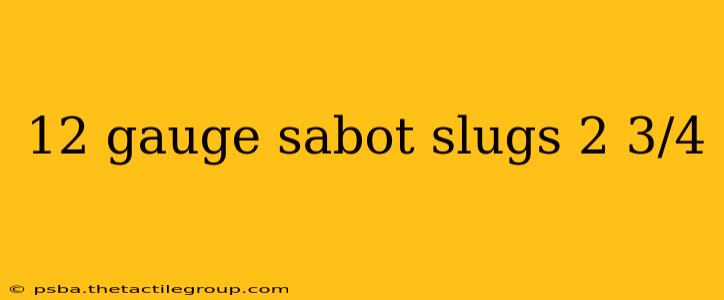The 12 gauge shotgun remains a popular choice for hunting, home defense, and sport shooting. Within the 12 gauge world, sabot slugs represent a specialized ammunition type offering improved accuracy and range compared to standard buckshot or slugs. This article will delve into the specifics of 2 3/4" 12 gauge sabot slugs, exploring their advantages, disadvantages, and considerations for various applications.
Understanding Sabot Slugs
Before we dive into the specifics of 2 3/4" shells, let's establish a foundational understanding of sabot slugs. Unlike traditional rifled slugs which engage the barrel's rifling directly, sabot slugs utilize a plastic or polymer sabot (a small, disposable sleeve). This sabot houses the slug and, crucially, engages the rifling, imparting spin for increased stability and accuracy. Once the slug exits the barrel, the sabot separates, leaving just the slug to travel to the target.
Advantages of 2 3/4" 12 Gauge Sabot Slugs
The 2 3/4" length is a common and widely available size for 12 gauge sabot slugs, offering several benefits:
- Improved Accuracy: The key benefit is enhanced accuracy at longer ranges compared to traditional slugs. The spin imparted by the rifling in the barrel significantly reduces the effects of drift and allows for more precise shot placement.
- Increased Range: This increased stability translates to a flatter trajectory and a longer effective range, making them suitable for hunting larger game at further distances.
- Reduced Recoil: While still substantial, recoil is often perceived as slightly less than with heavier slugs, contributing to a more comfortable shooting experience, especially for extended shooting sessions.
- Wide Availability: 2 3/4" 12 gauge sabot slugs are readily available from numerous ammunition manufacturers, ensuring accessibility for shooters.
Disadvantages of 2 3/4" 12 Gauge Sabot Slugs
Despite the advantages, there are some limitations to consider:
- Cost: Sabot slugs are generally more expensive than other 12 gauge ammunition types like birdshot or buckshot.
- Potential for Barrel Fouling: While not a significant issue with proper cleaning, the plastic sabot can leave behind residue, potentially leading to increased barrel fouling if neglected.
- Not Ideal for All Shotguns: While many shotguns can handle sabot slugs, some older or less robust models may not be suitable. Always check your shotgun's manual to ensure compatibility before use.
Applications of 2 3/4" 12 Gauge Sabot Slugs
These versatile slugs find applications in various scenarios:
- Hunting: Ideal for hunting larger game at longer ranges, such as deer or hogs, where accuracy is paramount. Their flatter trajectory allows for more precise shots, increasing the likelihood of a clean kill.
- Long-Range Target Shooting: Their accuracy makes them a popular choice for long-range shooting competitions and practice.
- Home Defense (With Cautions): While possible, overpenetration is a significant concern when using sabot slugs in close-quarters home defense scenarios. The risk of the slug passing through walls or other obstacles is considerably higher than with other ammo types.
Choosing the Right 2 3/4" 12 Gauge Sabot Slug
When selecting 2 3/4" 12 gauge sabot slugs, consider these factors:
- Slug Weight: Heavier slugs generally offer more energy and penetration but with increased recoil. Lighter slugs provide less recoil but may have reduced range and energy.
- Manufacturer Reputation: Choose reputable ammunition manufacturers with a proven track record of producing high-quality, consistent ammunition.
- Intended Use: The application (hunting, target shooting, or home defense) will significantly influence your choice of slug.
Conclusion
2 3/4" 12 gauge sabot slugs offer a compelling blend of accuracy, range, and manageable recoil. Understanding their advantages and limitations is crucial for selecting the right ammunition for your specific needs. Always prioritize safety, adhere to responsible firearm handling practices, and consult your shotgun's manual for compatible ammunition types. Remember to always practice safe gun handling and follow all local and state laws regarding firearm ownership and use.

